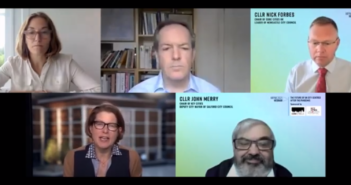The West Midlands is on a roll. MIPIM UK meets West Midlands Combined Authority chief executive Deborah Cadman to learn how the Metro Mayor is changing the game in the region.
The last two years has seen a revival in the region’s fortunes. Headline metrics show evidence of economic renaissance for the West Midlands. GVA per head is growing, record numbers of jobs are being created, exports are on the rise and skills are improving. Looking ahead, many economic fundamentals are expected to stay strong – with growth in sectors including real estate and Business, Professional and Financial Services.
The formation of the West Midlands Combined Authority(WMCA) and the election of a metro mayor for the region has been instrumental in galvanising business growth and investment into the region.
MIPIM UK caught up with Deborah Cadman OBE, chief executive of WMCA, to find out more about how the combined authority and the metro mayor are changing the game in the West Midlands.
MIPIM UK: Why was WMCA established?
Deborah Cadman OBE: The WMCA was established in 2016 by the seven Metropolitan councils (Birmingham, Coventry, Dudley, Sandwell, Solihull, Walsall and Wolverhampton) in the West Midlands to put the region in a stronger position to drive a new conversation with Government about the devolution of powers and resources that deliver faster and more joined up delivery of inclusive growth.
Devolution provides a once in a generation opportunity to transform the region through an ambitious programme of change focused on economic growth, transport, housing, skills and jobs. The WMCA was created by a shared commitment and endeavour to deliver this change. We have an overall ambition to enable a healthier, happier, better connected and more prosperous West Midlands.
We have a clear role and mandate to facilitate and co-ordinate the collaboration across our constituent councils and wider membership of LEPs and non-constituent councils who share that vision.
In short, the WMCA leads, enables and encourages growth. It leads the development of regional policy and programmes to achieve shared outcomes. And it provides a compelling case for attracting global investment.
What is the significance of a metro mayor? What difference will the mayor make?
Having an elected mayor provides clear civic leadership to the region. It provides a single point of contact between Whitehall and the region. The Mayor chairs the Combined Authority and, working with the leaders of seven constituent councils, provides political leadership to the region and the ambitious agenda we are delivering.
The Mayor has specific powers relating to transport, skills and housing, but can also spearhead campaigns and bring a region wide focus on specific issues and challenges such as homelessness and rough sleeping, youth unemployment, community cohesion and air quality – all of which impact on prosperity and growth.
The Mayor also helps forge a strong relationship with businesses and private sector. He is an advocate and global ambassador for the region, helping to build trade links and attract inward investment.
Your stated aim is to build a healthier, happier, better connected and more prosperous West Midlands. Can you tell us more about how WMCA can achieve that? What are the key priorities for WMCA over the next 2-3 years?
These are exciting times for the West Midlands. The region is already performing well. Growth is strong and optimism is high. We are making our mark.
We have a drumbeat of momentum behind us that will see in 2021 Coventry shining as the UK City of Culture and in 2022 the world will look to Birmingham as the Commonwealth Games is hosted here. Following that in 2026 two High Speed Rail stations will open here – connecting the region to London in under 45 mins. Major extensions to our Metro network will support greater connectivity within the region.
The long term vision and outcomes are clear. There is agreement and consensus about them, and a commitment both regionally and nationally to the delivery of them.
Our priorities over the next 2-3 years focus on delivering the outcomes – including more homes, extension of the metro network, and creation of new jobs. Visit the region and you will see the physical regeneration is already happening.
We have created the policy basis for much of this, including a Housing Deal with Government and a Regional Skills Plan. We will be one of the first regions to develop a Local Industrial Strategy which will determine the main sectors of the economy we will focus investment on.
What are the big opportunities for investors in the West Midlands?
Our investment prospectus highlights a range of investment opportunities across the region – commercial and regeneration opportunities. Many are investment ready. There is something for everyone. There are some compelling reasons why the region is the place to invest. We are a region built on social connection, on collaboration and on progress.
We already have more foreign direct investment projects than Croatia, Norway or Greece. Birmingham has the youngest population of any major city in Europe and we have more jobs from foreign investment than any UK region outside of the capital. Our population is predicted to grow by half a million in the next two decades with 20,000 digital and creative companies based here. With 2 million square feet of prime office space we are the place for opportunity and investment.
What is the long-term vision? How do you see the region changing over the next 10-15 years?
The West Midlands will see change and will be home to more than 1.9 million homes by 2030. This will include building at least 215,000 new homes. Jobs will increase from 1.9 million to 2.4 million and we will welcome 150,000 new businesses. Productivity will be 5% higher than the national average where 100% of urban and rural areas will have access to superfast broadband.
We are determined to ensure all of this will be connected to ensure we deliver growth that is inclusive. Growth that benefits local people and businesses. Growth that connects people and jobs, that provides homes that people want and can afford, and are well served by a transport network that is resilient and reliable. Our vision is that everyone will taste, touch and feel the benefits of the growth.



